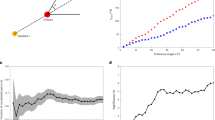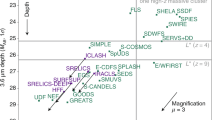Abstract
IT has recently been argued1,2 that the observation of close pairs of QSOs with very different redshifts provides support for non-cosmological explanations of the redshifts. We show in this note that the pairs observed so far may be comfortably explained as random coincidences and that the small probabilities that are often quoted depend on the use of a posteriori statistics.
This is a preview of subscription content, access via your institution
Access options
Subscribe to this journal
Receive 51 print issues and online access
$199.00 per year
only $3.90 per issue
Buy this article
- Purchase on Springer Link
- Instant access to full article PDF
Prices may be subject to local taxes which are calculated during checkout
Similar content being viewed by others
References
Stockton, A. N., Nature phys. Sci., 238, 37 (1972).
Wampler, E. J., Baldwin, J. A., Burke, W. L., Robinson, L. B., and Hazard, C., Nature, 246, 203 (1973).
Setti, G., and Woltjer, L., Proc. sixth Texas Symp. (in the press).
Arp, H. C., in The Redshift Controversy (edit. by Field, G., Arp, H., and Bahcall, J.) (Addison-Wesley, New York, 1973).
Author information
Authors and Affiliations
Rights and permissions
About this article
Cite this article
BAHCALL, J., WOLTJER, L. Close Pairs of QSOs. Nature 247, 22–23 (1974). https://doi.org/10.1038/247022a0
Received:
Issue Date:
DOI: https://doi.org/10.1038/247022a0
This article is cited by
Comments
By submitting a comment you agree to abide by our Terms and Community Guidelines. If you find something abusive or that does not comply with our terms or guidelines please flag it as inappropriate.



